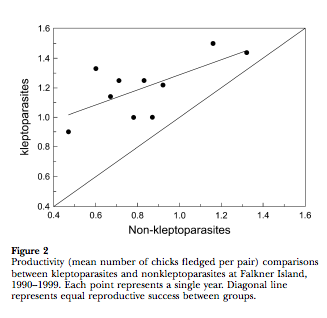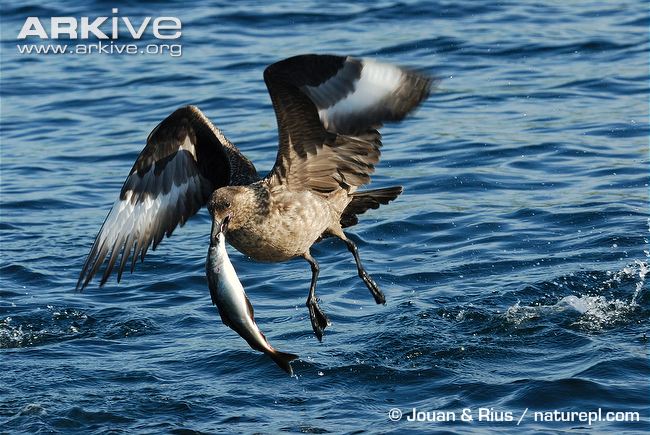Kleptoparasitism
Biology 342 Fall 2012
Erin Appleby and Ryan Streur
Adaptive Value of Kleptoparasitism in Seabirds
Adaptive value refers to the question of what about this particular behavior has interacted with the environment such that the species associated with that behavior continues to survive today. In other words, how has this behavior served the organism to increase its lifetime reproductive fitness? (Tinbergen, 1963) Lifetime reproductive fitness is the number of viable offspring an organism can produce over the course of its life.
Kleptoparasitism in seabirds allows them to more efficiently gather food from their environment. Facultative parasites like seabirds also utilize alternate and more common foraging strategies, notably direct predation of fish.
Optimal Foraging Theory
Kleptoparasitism, as a foraging strategy, can be explained through optimal foraging theory. Each act of foraging, or food searching, involves an energy cost, offset by an energy gain in the form of food obtained through the foraging. Optimal foraging theory states that animals maximize their net energy gain for each instance of a foraging behavior. In instances where stealing food from a host seems less costly than foraging for prey to obtain the same energy benefit (i.e. meal) the seabird will choose kleptoparasitism.
Some researchers have criticized optimal foraging theory because not all animals behave optimally. That is, their behavior is not perfectly calculated and adjusted to optimize nutrient intake and reproductive fitness. However, optimal foraging theory is not intended to be a perfect predictor of the forager’s behavior; rather, optimal foraging theory provides a method of interpreting certain vairables which might have an impact on an animal’s reproductive fitness (Alcock 2005). 
Reproductive Fitness and Parental Quality
Another way to interpret the adaptive value of kleptoparasitism is through examining its effect on "parental quality." Parental quality refers to the reproductive success of individual animals over several mating attempts, but can be measured as the number of chicks that survive.
In roseate terns (Sterna dougallii), some pairs of parents practice kleptoparasitism while some do not. The ability of parents to provide food to their chicks affects the health and survival of offspring. Parental quality among roseate terns has been shown to be significantly higher in kleptoparasitic parents than in honest ones, especially in times of food scarcity (Shealer 2004). Both parameters were shown to be significantly higher in chicks with kleptoparasitic parents.
